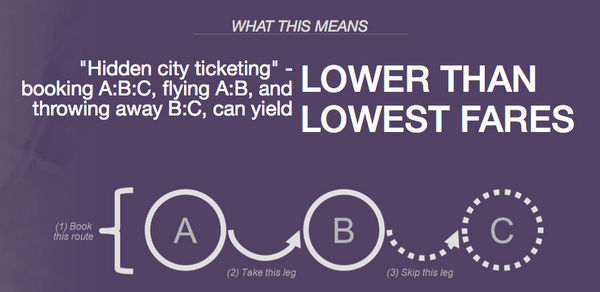 United and Orbitz have sued to shut down skiplagged.com, a site that allows people to book multi-stop flights with the goal of getting off before the final destination they are booked to. This can often save money. That would be Hidden City ticketing. There is also its companion idea…buying a roundtrip ticket and only using one-way to save money.
United and Orbitz have sued to shut down skiplagged.com, a site that allows people to book multi-stop flights with the goal of getting off before the final destination they are booked to. This can often save money. That would be Hidden City ticketing. There is also its companion idea…buying a roundtrip ticket and only using one-way to save money.
United and Orbitz complain that “In its simplest form, a passenger purchases a ticket from city A to city B to city C but does not travel beyond city B. ‘Hidden City’ ticketing is strictly prohibited by most commercial airlines because of logistical and public-safety concerns.â€
The founder of skiplagged, Aktarer Zaman, hasn’t made any money off the site, but he is bringing attention to a giant loophole airlines don’t want you to exploit. And the airlines, though hard to enforce, do have legal recourse under their contract of carriage.
Most airlines include a clause that states if you change your journey, you could be liable. United states…
- Invalidate the Ticket(s)
- Cancel any remaining portion of the Passenger’s itinerary;
- Confiscate any unused Flight Coupons;
- Refuse to board the Passenger and to carry the Passenger’s baggage, unless the difference between the fare paid and the fare for transportation used is collected prior to boarding
- Assess the Passenger for the actual value of the Ticket which shall be the difference between the lowest fare applicable to the Passenger’s actual itinerary and the fare actually paid.
- Delete miles in the Passenger’s frequent flyer account (UA’s Mileage Plus Program), revoke the Passenger’s Elitestatus, if any, in the MileagePlus Program, terminate the Passenger’s participation in the MileagePlus Program, or take any other action permitted by the MileagePlus Program Rules in UA’s “MileagePlus Rules;†and
- Take legal action with respect to the Passenger.
But, isn’t this unethical, if nothing else? People justify acting in a dishonest way because they feel that airlines are big corporations and thus behavior that would be unacceptable in other contexts is acceptable here.
The counterargument is that it is simply buying more than you want to get a discount…it does not create an obligation to use the portion you did not want. But, if using it is in the terms of sale, that is a very different thing.
Reading many comments, the idea that this behavior is unethical is not the popular one, because people don’t like the idea that a two segment itinerary could cost less than a one-segment. Example, flying New York to Cincinnati costing more than New York to Dayton via Cincinnati. Airlines price based on market conditions from Point A to Point B, not always factoring in the costs of the intermediate point. It is counterintuitive sometimes, but a business has a right to sell their product any way they wish.
The airline claim a logistics and public safety issue, but in reality that is negligible. It is, as American put it in a statement of support, “tantamount to switching price tags to obtain a lower price on goods sold at department stores.” You are not buying what the airline is selling.
You can petition an organization to change, vote with your wallet. You can petition the government to regulate an airline’s obligation to its customers. But again, anyone who engages in this behavior is rationalizing their own unethical behavior by saying the other side(the airline) is just as unethical. That doesn’t justify it.
I disagree entirely. Nothing unethical about paying for a product and only using part of it. Unethical for the airlines to threaten people over it rather than fix their pricing.